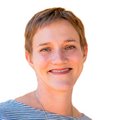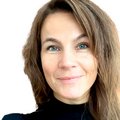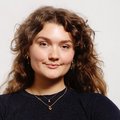Become an expert within your own field
MA in Curating at Aarhus University offers a unique opportunity for you to become an expert within your own field. Its flexible programme is designed for working professionals who wish to develop their own practice in an international and interdisciplinary context.
Curating is considered here in its widest sense as a cultural practice that spans numerous disciplines and cultural fields. The programme explores the close relationship between theory and practice, allowing you to build on your own experiences while acquiring new concepts and methodologies. It enables you to expand your professional network by meeting international curators, scholars and students, both in the classroom and on field trips. MA in Curating also enhances your career opportunities by introducing you to new tools and perspectives, as well as a range of contemporary institutions and platforms.
You can learn more about the MA in Curating programme below, including information on admission requirements and the application procedure.
If you have any questions, feel free to contact programme coordinator Edward Alan Payne.

Chief Curator and Director of Education,
San Luis Obispo Museum of Art, USA
“The MA in Curating was sincerely transformative for me and my practice. As the lead curator of a small and somewhat rural museum, it is often challenging to step back from the day-to-day logistics to think critically – and globally – about the theories and concepts that inform curatorial practice. The MA in Curating programme created a thoughtful and discursive environment to do exactly that. I was thoroughly challenged and grew in remarkable ways academically and critically. I highly recommend this programme to anyone in the field who is looking to deepen their work.”

Head of Communication and Marketing, Copenhagen Photo Festival, Denmark
“The MA in Curating has been a great experience. I have enjoyed the seminars in different art institutions across Denmark and Sweden, giving us the opportunity to encounter a range of curatorial voices from ‘behind the scenes’.
The discussions, connections and new friendships that arose from these meetings have also been enriching.
Additionally, I now feel more assured in what I do. The experience has given me new tools to think with and a more accurate language to approach curatorial dilemmas and uncertainties, which are an inevitable part of curating.”

Coordinator of Culture, Vallentuna Municipality, Sweden & independent curator and writer
"I applied to the MA in Curating programme at Aarhus University to explore and develop my curatorial interests. The programme provided me with resources to delve into the curatorial from different perspectives, broaden my network of collegaues within the arts as well as provide time and space to indulge in critical thinking and writing."

Principal Curator & Creative Director, NAMARA, Canada
"I enrolled in the MA in Curating programme in 2020 with the primary goal of updating my knowledge of contemporary theory. I possessed fifteen years’ experience in the field, but given my commercial work context, I had been presented with few opportunities to hone critical writing skills. The programme brought me into proximity with an international cohort of curators with wide ranging experience sets, and provided ample opportunities for us to discuss, debate, and challenge the literature.
We explored curatorial work firsthand through gallery, museums, and biennale visits, balancing theoretical depth with practical engagement. The course administrator considered our diverse professional backgrounds, enabling us to focus on subjects directly relevant to our practices. What proved most valuable was the resulting dialogue that prompted each of us to consider matters from other perspectives. For my part, I delved deeply into art and business relationships, enriching my ongoing practice. I emerged from the programme as an expert in my field, profoundly grateful for the transformative experience."
The MA in Curating is a professional Master’s degree programme designed for practitioners and professionals in the fields of curating, cultural programming, education and communication. It is an international, two-year, part-time and low-residency degree programme that enables you to establish an interdisciplinary understanding of curating in contemporary society and develop your own position within the field. The programme is designed in a way that allows you to maintain a full-time job while studying.
Building on the experiences and practices of the enrolled students, the MA in Curating focuses on the close relationship between practice and theory, doing and thinking, and experience and reflection. During the programme, you will be introduced to theories, concepts and methodologies that enable you to analyse and evaluate curatorial practices and projects and to self-reflectively develop your own curatorial practice. The MA in Curating is furthermore organised in a way that allows you to pursue individual learning and research interests alongside the shared curriculum and course work.
Throughout the programme, you will be able to expand your network through interaction with international curators, scholars and fellow students – both in the classroom and during field trips. By introducing you to new tools and perspectives, the programme also enhances your career opportunities and enables you to operate within and across a range of contemporary institutions and platforms that organise, present and convey exhibitions and other curated activities.
The MA in Curating provides a challenging, international study environment that draws on the expertise of researchers across departments at Aarhus University as well as visiting scholars and curators. The programme also has partnerships with a number of prominent art and cultural institutions that we visit and engage with during the course of the programme (see lists below).
To learn more about the degree programme, take a look at Light Bulbs and Round Tables: A Conversation about MA in Curating at Aarhus University by alumni Line Sandvad Mengers and Nanna Balslev Strøjer and former programme coordinator Trine Friis Sørensen. The conversation is published by Peripeti – Journal of Dramaturgical Studies in 2022.
The MA in Curating is designed for practitioners and professionals in the fields of curating, cultural programming, education and communication, who wish to develop their professional practice in an international and interdisciplinary environment.
Students generally enrol in the programme to strengthen their existing curatorial or cultural profile or to support their transition into curating from a related field/practice, e.g. artistic practice or communication.
The programme enables students to operate within and across a range of institutions, platforms and contexts that organise, present and convey exhibitions and other curated activities, for example museums, art centres, galleries, biennials, festivals, cultural programming at large, publishing, art education, and organisations, private enterprises and self-organised initiatives within the cultural field.
Applicants must have an appropriate educational background, a minimum of two years of relevant, practical experience obtained after completing the degree programme on which admission is based, and English proficiency according to the specifications below.
Enrolment in the programme also requires
All applicants with a non-Danish qualifying degree must document English language qualifications comparable to an ‘English B level’ in the Danish upper secondary school (‘gymnasium’).
English language qualifications comparable to an ‘English B level’ in Denmark can be documented as follows:
For further information, please read the description of the English language requirements.
How to apply
Your application must be submitted online through the application portal. Simply click the blue button "Apply for admission" to start. You may save your application and submit it at a later stage.
As part of your application, you are required to upload your transcripts, CV and documentation of work experience from third party e.g pay slips, employment contract or statement from the employer covering minimum two years of fulltime work post-graduation.
The sooner we receive your documents, the sooner we can process your application. We strive to provide feedback and assessment on applications on an ongoing basis. You may re-submit additional documents if needed.
MA in Curating comprises four modules of 15 ECTS credits each that can be taken sequentially over two years of part-time study or as individual modules. In order to complete the fourth and final module, students must have finished the first three modules.
The programme includes lectures, seminars, discussions, group work, independent study, peer learning, workshops, field trips, individual supervision and peer feedback, and is supported online by AU’s digital learning platform.
All courses are taught in English. Discussions, assignments and exams are also in English.
Find more information about the degree programme, examination rules etc. in the Academic Regulations for the Professional Master’s Degree Programme in Curating (2022)
The programme is offered under the Board of Studies of the School of Communication and Culture.
Module 1: Fall 2024
Online welcome session: August 30th, 10 – 11 a.m.
Seminar 1: September 13th – 15th; Aarhus
Seminar 2: October 25th – 27th; Copenhagen
Seminar 3: November: 22nd – 24th; online
Teachers: Jussi Parikka, Jacob Fabricius, Daniela Agostinho, Edward Alan Payne and others.
Module 2: Spring 2025 (preliminary programme)
Seminar 1: February 7th – 9th in Aarhus
Seminar 2: March 21st – 23rd, online
Seminar 3: April 25th – 27th in Stockholm
Dates and destination will be confirmed by September 2024.
Module 3: Fall 2025
Module 3 will (like module 1 and 2) consist of three seminars – one in Aarhus, one online and one in an European destination such as Berlin, Paris or London.
Dates and destination will be confirmed by February 2025.
Module 4: Spring 2026
Curatorial Project (Master's Project).
The module is delivered through dedicated supervision, supplemented by peer support. A mid-process workshop/seminar will be planned.
The MA in Curating draws on the expertise of scholars across a number of departments at Aarhus University as well as visiting curators and scholars. The programme furthermore collaborates with a number of art, cultural and educational institutions.
The lists below include some of the institutions, scholars and curators that we have engaged with so far, many of which will return in the next round of the programme.
The programme was established at the initiative of Jacob Lund, Geoff Cox and Jette Gejl Kristensen.
Updated December 21st, 2023:
The first three modules consist of three intensive three-day seminars (Friday–Sunday). During autumn modules, seminars usually take place in September, October and November and during spring modules in February, March and April. Each semester will one seminar take place in Aarhus, one seminar will take place online in a virtual classroom and one seminar will take place in another city in Denmark or Europe in relation to one or more partner institutions. We will announce the specific place and time at least 6 months prior to the seminars.
Seminars in Aarhus predominantly take place at the
School of Communication and Culture
Aarhus University
Langelandsgade 145
8000 Aarhus C
No. Building networks, engaging with professionals, visiting exhibitions and sharing experiences are essential aspects of the programme, which makes in-person participation necessary. However, the first three modules are likely to include online sessions in between seminars, supervision can take place online, and the fourth and final semester is primarily online.
Yes, the programme has accommodated overseas students before, but you have to be willing to travel three times during each of the first three modules and for exams that require in-person participation.
Unless you are absolutely sure that you only want to follow a single module, we recommend that you apply for the whole programme in order to secure your place in the programme. Tuition fees are charged per module, which means that your enrolment in a forthcoming module is not final until the payment has been made. You can withdraw from a module and be reimbursed if we receive your cancellation no later than 1. september for modules beginning in autumn and 1. February for modules beginning in spring. Please note it is not posible to be reimbursed after the cancellation deadline.
The workload is consistent with part-time (50%) studies with varying degrees of intensity. You will have to carve out time to study, especially before seminars and during exam periods. Many students work full-time while enrolled and schedule their reading and writing for week nights, weekends and holidays.
The full programme must be completed within six years of enrolment. If you are enrolled in single modules, you must finish no later than two years after enrolment.
You have to plan and cover your own travel and accommodation expenses during seminars. Low-budget hotels in Aarhus include Wakeup Aarhus and Cabinn Aarhus. You usually do not have to spend much money on books as most literature is shared via AU’s online learning platform.
All visitors to Denmark must have a valid passport to enter the country. Visa and residence permit requirements may vary and are always subject to change, so it would be wise to check with the Danish embassy or consulate in your area before finalising any travel plans. For more information about visa and residence permit requirements, please visit the Danish Immigration website: newtodenmark.dk.
The tuition fee for the MA in Curating is DKK 82,000 for 60 ECTS credits (DKK 20,500 per module of 15 ECTS-credits).
The fee is charged per module and covers the classes in the relevant semester and three examination attempts per module.
In addition to the tuition fee, students will be expected to contribute to the costs of their studies when travelling to other locations, as several sessions will be arranged elsewhere in Europe. Visits to other events and institutions are considered to be an important part of the programme, both to share experiences and to extend networks.
All non-EU/EEA/Swiss citizens (including students holding a British national overseas passport) are liable to pay an additional tuition fee of EUR 8,000 for 60 ECTS credits or EUR 2,000 for 15 ECTS credits.
For questions about academic content and relevance, please contact
Programme coordinator Edward Alan Payne, e-mail: edward.payne@cc.au.dk.
For questions regarding admission requirements, application process and requirements, enrolment and invoicing, please contact
Continuing Education, Arts
Faculty of Arts
E-mail: evu.arts@au.dk
Phone: +45 87 16 10 97